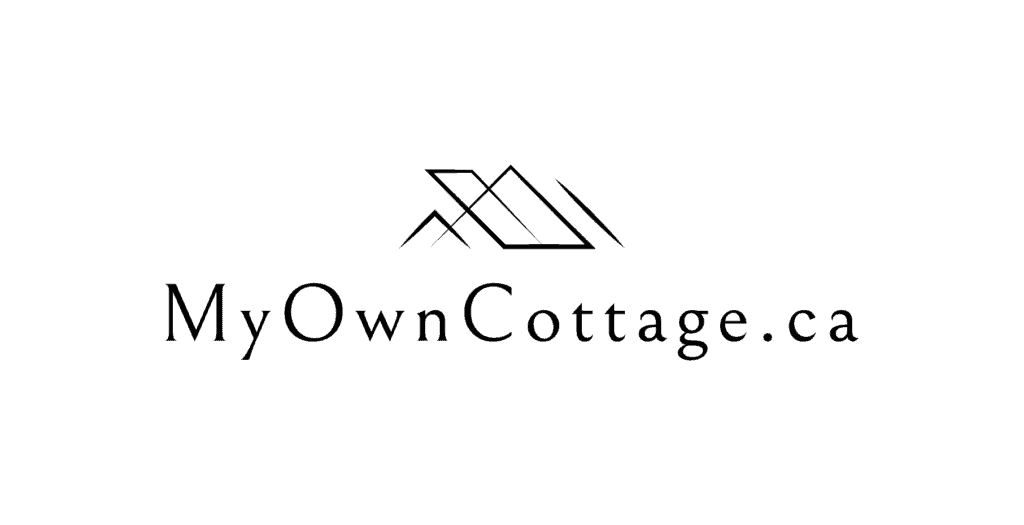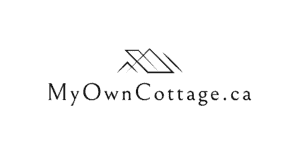Financing Availability for Small Prefab Homes in Ontario
📅 Last updated: September 18th, 2025
✍️ Written by prefab building specialists at My Own Cottage
Small prefab homes are an increasingly popular and practical housing choice in Ontario, offering affordability, sustainability, and faster construction times.
Homebuyers can access several financing options, including traditional mortgages, construction loans, and government programs that provide incentives for energy-efficient or affordable housing projects.
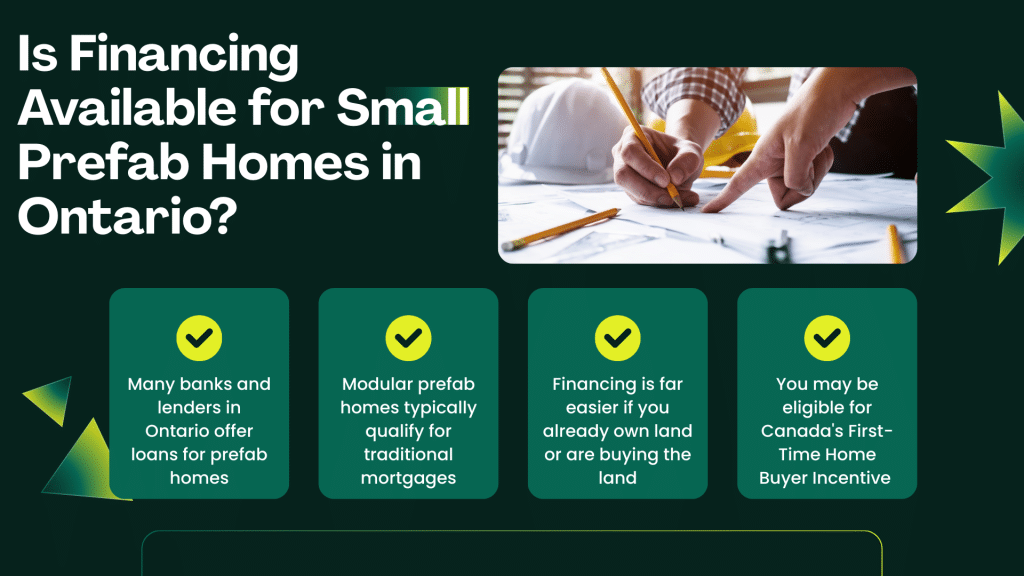
Whether you’re a first-time buyer or planning to downsize, financing a prefab home in Ontario is not only possible—it may also be more flexible than you expect.
👉 For a complete market overview, explore our guide to Small Prefab Homes in Ontario for Sale to see current listings and prices.
How Financing Works for Small Prefab Homes in Ontario
Small prefab homes are becoming popular in Ontario, since demand continues to grow for affordable and eco-conscious options.
But financing a prefab home in Ontario can work a little differently than financing a traditional house.
Lenders typically consider these key factors:
🏗️ Prefab Home Foundation Type and Mortgage Approval in Ontario
Permanent foundation = easier financing.
If your prefab home is placed on a permanent foundation, it’s treated like a conventional house and usually qualifies for standard mortgages.Non-permanent foundation = limited options.
Homes set on piers, blocks, or temporary bases may face stricter lending requirements and could require alternative financing solutions.
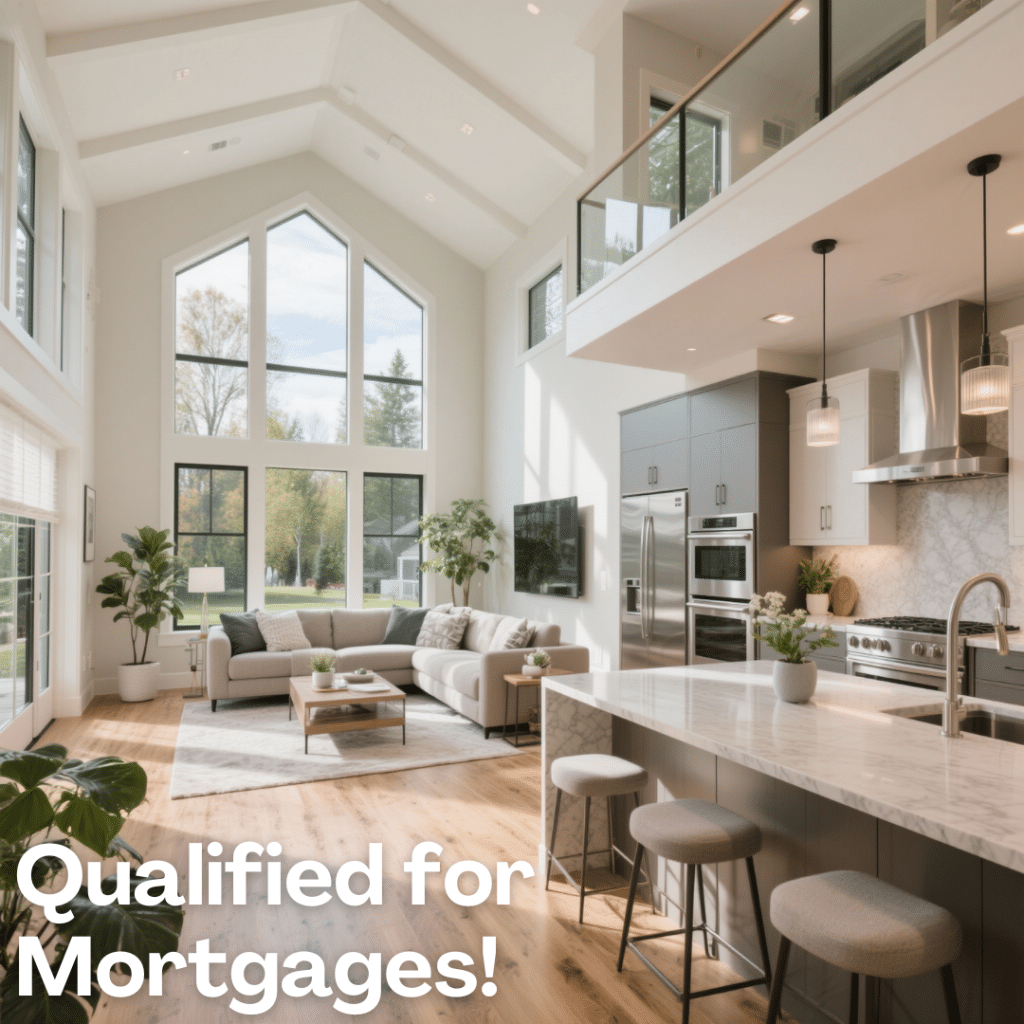
🏠 Modular vs Manufactured Homes: Financing Differences in Ontario
Modular homes (built in sections and assembled on-site) are generally eligible for traditional mortgages and offer greater financing flexibility.
Manufactured or mobile homes may face restrictions, as they’re often classified differently, which can limit mortgage options.
For buyers considering customization, it’s worth reviewing whether small prefab homes can be customized in Ontario before finalizing lender agreements.
✅ Why CSA Certification Matters for Ontario Prefab Mortgage Approval
Most lenders require prefab homes to carry CSA certification, confirming that the build meets Canada’s national safety and quality standards. Without this certification, financing choices may be significantly reduced.
🔑 Pro Tip
Work with lenders who have experience in prefab housing. Their approval process is often very similar to traditional mortgages, which can speed up financing. Also, explore our CSA-compliant prefab designs to ensure your home qualifies.
If you’re considering ownership, it’s also helpful to know where you can buy small prefab homes in Ontario to compare market availability before financing.
Ontario Mortgage Broker Insights on Financing Prefab Homes
“Many people are surprised to learn that prefab homes — when placed on a permanent foundation and CSA-certified — are just as mortgageable as any traditional home in Ontario. As an example for buyers in Simcoe County, we also provide localized guidance on financing for prefab homes in Barrie. The key is partnering with a lender who understands the prefab process and timeline.”
— Laura McKenzie, Licensed Mortgage Broker, Specialist in Modular & Non-Traditional Housing Finance (Orillia, Ontario)
🏘️ In cases where homes are delivered as modular units, some buyers explore whether small prefab homes are sold move-in ready or as kits in Ontario to better plan financing.

Understanding prefab financing in Ontario becomes much easier with insights from industry experts.
Mortgage professionals like Laura McKenzie guide clients through key steps such as:
Foundation and land ownership requirements – ensuring the home qualifies for mortgage approval.
Specialized appraisals – tailored for modular, prefab, or tiny homes.
Government incentives and construction loans – helping buyers access available financial support.
Working with an experienced broker not only streamlines the financing process but also helps prefab homebuyers avoid common pitfalls.
Buyers often ask whether small prefab homes are eligible for residential mortgages, which depends on both CSA certification and lender familiarity.
Beyond mortgage approval, it’s important to confirm what permits are required to build a small prefab home in Ontario, since permitting can directly affect financing timelines.
Ontario Prefab Home Financing vs Traditional Mortgages
Financing a prefab home in Ontario isn’t radically different from financing a traditional stick-built house — but there are important differences that can affect your budget, approval process, and timeline.
To better understand these costs, you can also review our small prefab homes Ontario with prices guide.
💡 At-a-Glance Comparison
| Factor | Prefab Homes | Traditional Homes |
|---|---|---|
| Loan Approval Rates | Slightly lower overall (fewer lenders familiar with prefab) | High — well understood by most lenders |
| Down Payment | 5–20% (higher if classified as manufactured or tiny home) | 5–20% (standard CMHC-insured minimums) |
| Appraisals | Often require specialized appraisers with modular expertise | Standardized process, widely available |
| Mortgage Timing | 60–120 days (due to construction draws, permitting, delivery) | 30–45 days for resale or new builds |
| Builder Approval | Must be CSA-certified or lender-approved | Broad builder acceptance |
| Government Incentives | More access to green housing grants and net-zero rebates | Fewer options unless upgrades are added |
🔍 Because approval rates can vary, many first-time buyers also want to know how long it takes to order and receive a small prefab home in Ontario, since mortgage draws must align with delivery schedules.
Loan Approval Rates
While more banks are warming up to prefab financing, traditional homes still see higher approval rates. Working with CSA-certified builders and lenders experienced in modular homes can significantly improve your chances of approval.
👉 Pro Tip: Credit unions and alternative lenders are often more flexible with prefab and non-standard builds than major banks.
💰 Down Payment Requirements
Prefab (non-standard builds): May require higher down payments, especially for movable tiny homes or manufactured units.
Prefab (CSA-certified & permanent foundation): Standard 5–20% down payment rules apply, just like traditional homes.
🏠 Appraisal Differences
Prefab appraisals must often account for:
Construction stage (if the home isn’t yet installed)
Land ownership status
Delivery and foundation costs
By contrast, traditional homes use straightforward market comparables, making the process quicker and more predictable.
⏱️ Speed of Mortgage Closing
Traditional homes: Typically close in 30–45 days.
Prefab homes: May take 60–120 days, especially when using construction or progress-draw financing.
Common delays include:
Permitting requirements
Foundation installation
Delivery and assembly from the manufacturer
Eco-conscious buyers may also want to explore which Ontario companies offer eco-friendly small prefab homes, since some lenders provide incentives for energy-efficient builds.
Ontario Prefab Mortgage Options: Banks, Credit Unions & Private Lenders
🏦 Traditional Bank Mortgages
Major banks in Ontario do approve prefab home mortgages — provided the home is permanently installed on a foundation.
To qualify, buyers typically need:
A detailed builder agreement outlining the project.
CSA certification to confirm the home meets Canadian safety and quality standards.
Proof of property ownership for the land where the home will be placed.
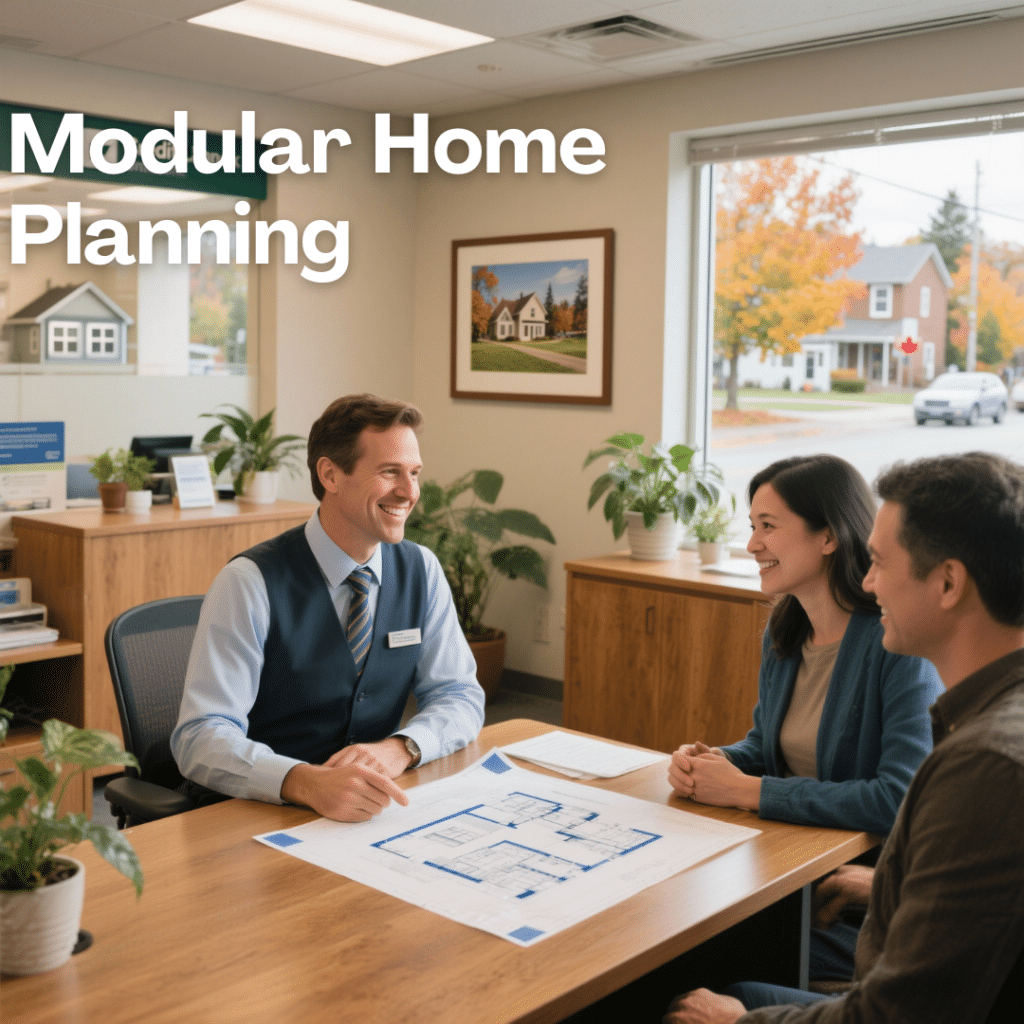
💳 Credit Union & Alternative Lenders
Credit unions and alternative lenders often provide more flexible financing options for prefab buyers, especially for non-standard builds like manufactured or tiny homes. These lenders may:
Use appraisal methods tailored to modular construction.
Accept borrowers with shorter credit histories or less conventional applications.
Offer progress-draw financing for homes under construction.
🏗️ Private Lending & Construction Loans
If banks or credit unions hesitate, private lenders can provide short-term financing for prefab homes. While interest rates are usually higher, they can be a valuable option for buyers who need fast approvals or have unique property situations.
Many prefab buyers also turn to construction loans, which cover costs during the build and then convert into a standard mortgage once the home is completed and inspected. These loans typically finance:
Factory build and delivery of the home
Foundation installation and site preparation
Final assembly and finishing work
👉 Pro Tip: Work with a broker who understands construction draw schedules — this ensures funds are released at the right stages and helps prevent costly delays.
Case Study: Financing a CSA-Certified Prefab Home in Ontario
Client Profile
Names: Sarah and Daniel Thompson
Location: Barrie, Ontario
Buyer Type: First-time homebuyer couple in their early 30s
Budget: $300,000
Home Type: 900 sq. ft. CSA-certified modular prefab home
Land Status: Purchased small rural lot outside Barrie
Financing Challenges
Sarah and Daniel worried their prefab home wouldn’t qualify for a traditional mortgage.
Initial hesitation from major banks due to appraisal requirements.
Needed financing to align with construction and delivery schedules.
Solution
Worked with Laura McKenzie, a licensed mortgage broker specializing in prefab homes.
Secured a credit union mortgage with a 10% down payment.
Approval supported by a lender-approved appraiser with prefab expertise.
Financing structured with progress-draw payments:
First draw for factory build.
Second draw after foundation completion.
Final draw upon home delivery and inspection.
Outcome
Approved for a 25-year fixed mortgage at 5.1% interest rate.
Total financing covered land, foundation, delivery, and assembly.
Construction + delivery completed in 4 months, move-in ready within 5.
Sarah and Daniel saved ~20% compared to a traditional stick-built home.
Their prefab home also qualified for Ontario’s Green Housing Rebate, reducing upfront costs further.
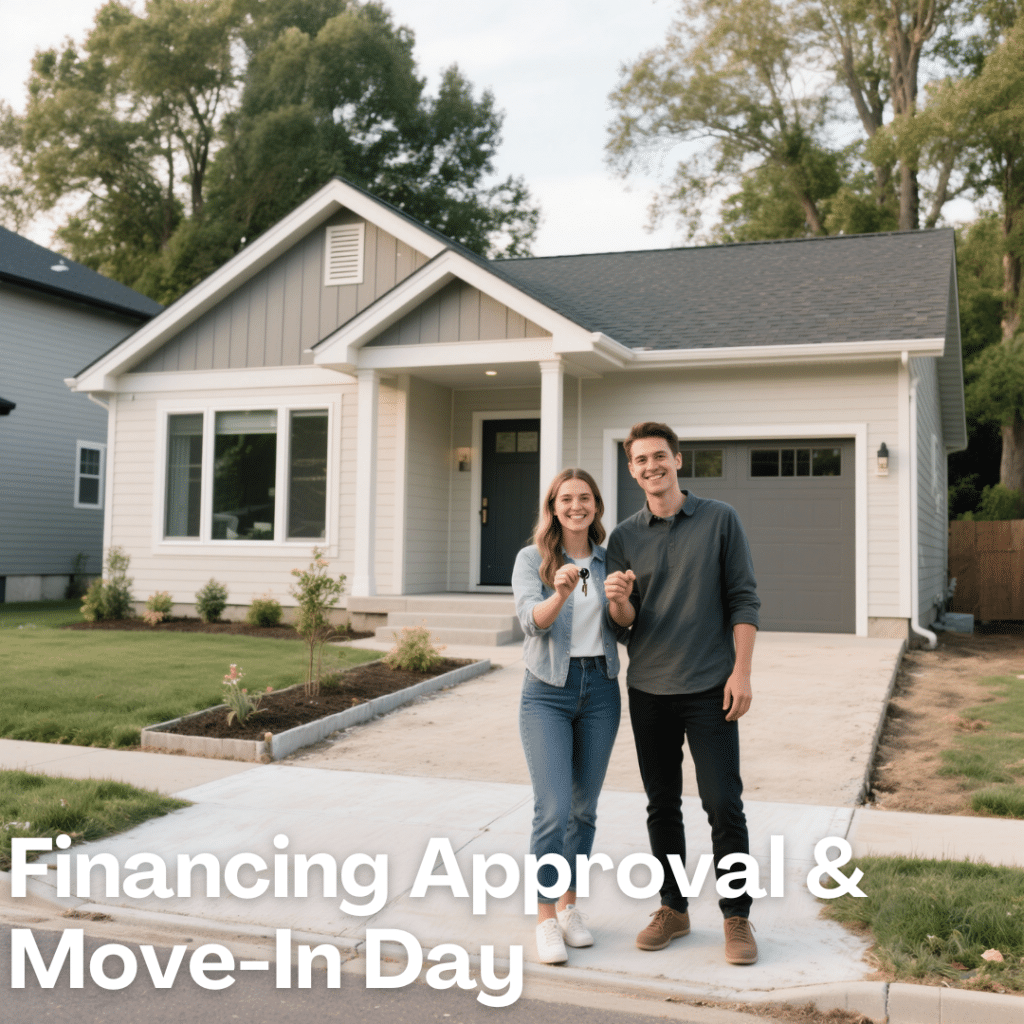
Testimonial
“We never thought prefab financing would be this straightforward. Our broker guided us every step of the way, and now we’re living in a beautiful home we can actually afford.” — Sarah Thompson
Key Takeaway
Sarah and Daniel’s experience shows that with CSA certification, a permanent foundation, and the right broker-lender partnership, prefab homebuyers in Ontario can secure affordable mortgages that mirror traditional housing finance.
Government Programs & Incentives for Small Prefab Home Financing in Ontario
Ontario buyers can take advantage of several programs that support affordable and energy-efficient prefab housing.
These include incentives that reduce the cost of construction loans for prefab homes and help with modular home mortgage eligibility in Ontario:
CMHC Prefab Mortgage Program – Provides mortgage loan insurance for eligible prefab homes, helping buyers access better rates with lower down payments.
First-Time Home Buyer Incentives – Federal and provincial programs offer reduced down payments, rebates, and tax credits to make ownership more accessible.
Green Housing Loans & Rebates – Energy-efficiency grants and net-zero housing incentives in Ontario may reduce upfront costs if the prefab home meets eco-friendly standards.
Tax Credits & Subsidies – Provincial tax credits and federal subsidies can help offset the cost of building or purchasing a qualifying prefab home.
💡 Did you know? Federal financing options for prefab housing can be combined with Ontario’s provincial incentives—making sustainable and net-zero builds more affordable than many buyers expect.
Moreover, if your priority is sustainability, you may also consider if small prefab homes are more energy-efficient than traditional houses, since efficiency is often tied to rebate eligibility.
Prefab Financing Challenges in Ontario & How to Overcome Them
| Challenge | Solution |
|---|---|
| Appraisal concerns | Work with brokers and appraisers who specialize in prefab housing. |
| High down payments | Expect 5%–20%, but explore first-time buyer incentives and rebate programs to reduce costs. |
| Builder not approved | Choose CSA-certified builders who already have partnerships with recognized lenders. |
⚠️ Disclaimer: Mortgage rules and eligibility criteria can change. Always consult a licensed mortgage broker or financial advisor before applying for financing.
Relatedly, buyers frequently ask can you put a small prefab home on any type of property in Ontario, since land-use restrictions can determine mortgage eligibility.
Tips to Secure the Best Prefab Mortgage in Ontario
Compare lenders – Some Ontario banks, credit unions, and alternative lenders offer better rates or more flexible terms for prefab housing. Don’t settle for the first offer — shop around.
Improve your credit score – A higher score can unlock lower interest rates and improve approval odds with traditional lenders.
Work with a broker – Local mortgage brokers who specialize in prefab housing know which lenders finance modular builds and how to structure applications for success.
💡 Pro Tip: Ask your broker if they have experience with CSA-certified prefab homes — this can speed up approvals and help you access more competitive rates.
👉 Need more information to make smarter decisions? Explore our full guide on Small Prefab Homes Ontario for Sale.
Financing Options for Small Prefab Homes in Ontario
Financing options for small prefab homes in Ontario are accessible — from traditional banks and credit unions to private lenders and government incentive programs.
That said, prefab financing does differ from traditional mortgages and requires careful planning. By:
Working with experienced mortgage brokers
Comparing offers from multiple lenders
Choosing CSA-certified builders
buyers can secure affordable, reliable financing for their prefab projects.
👉 Ready to get started?
Book a free consultation, call us directly, or browse our design catalogue today to take the first step toward your new prefab home.
🧑💼 Request a Free Consultation
📲 Call Us Directly: (705) 345-9337
🏘️ View Our Design Catalogue
✅ Ontario-Built | ⚡ Energy-Efficient | 🏡 Fully Customizable | 🚚 Fast Delivery
Alternatively, for your convenience, you can also simply fill out the contact form below and we’ll get back to you soon! 👇
FAQ: About the Financing Available for Small Prefab Homes in Ontario
Do Small Prefab Homes in Ontario Qualify for Mortgages?
Yes, small prefab homes in Ontario can qualify for mortgages if they are permanently affixed to a foundation and CSA-certified, which most lenders require.
How Much Down Payment Is Needed for a Small Prefab Home in Ontario?
For small prefab homes in Ontario, buyers typically need a 5–20% down payment, depending on the lender, property value, and credit history.
Is CMHC Insurance Available for Small Prefab Homes in Ontario?
Yes, small prefab homes may be eligible under the CMHC prefab home mortgage program if they meet construction and certification requirements.
Can I Finance a Small Prefab Tiny Home in Ontario?
Yes, but small prefab tiny homes in Ontario may not meet standard mortgage rules. Buyers often turn to credit unions, alternative lenders, or personal loans.
Are Small Prefab Homes in Ontario Cheaper to Finance Than Traditional Homes?
Not always. While small prefab homes are often more affordable to build, financing rules, appraisals, and lender criteria can make them similar in cost to traditional home loans.
Can Small Prefab Homes in Ontario Be Refinanced Like Traditional Homes?
Yes, refinancing is possible for small prefab homes in Ontario if they meet lender guidelines, though appraisals and valuation can affect terms.
Do Lenders Accept All Small Prefab Home Builders in Ontario?
No. Most lenders in Ontario require small prefab home buyers to use CSA-certified or approved builders to ensure quality and compliance with mortgage rules.
What Is the Resale Value of a Small Prefab Home in Ontario?
Small prefab homes in Ontario generally maintain strong resale value if well built and properly located, though lender and appraisal practices may affect pricing.
Why Do Some Banks Hesitate to Finance Small Prefab Homes in Ontario?
Some banks remain cautious due to appraisal challenges and lingering misconceptions, but more lenders are now offering prefab-friendly financing options.
Can First-Time Buyers Finance Small Prefab Homes in Ontario?
Yes, first-time buyers can access programs like Ontario prefab housing incentives and federal affordability initiatives to finance small prefab homes.
Are There Any Builders Who Can Help Me Finance My Small Prefab Home in Ontario?
Yes. My Own Cottage is a reputable Ontario prefab home builder that partners with qualified mortgage brokerages to help clients secure financing. This support ensures buyers receive expert guidance and access to lenders familiar with prefab housing requirements.
🛡️ Verified Third-Party Resources
For added confidence and transparency, here are trusted external sources that support modular homebuilding in Ontario:
Ontario Building Code (O. Reg. 332/12)
Official provincial regulations that govern modular and factory-built homes.Tarion Warranty Corporation
Provides home warranty coverage and builder licensing in Ontario.Canadian Home Builders’ Association (CHBA)
National organization supporting residential construction, modular certification, and best practices.CMHC – Canada Mortgage and Housing Corporation
Federal housing authority offering insights on modular housing affordability, financing, and energy efficiency.Statistics Canada: Housing Data
Data-driven research on Canadian housing trends, ownership, affordability, and construction.
